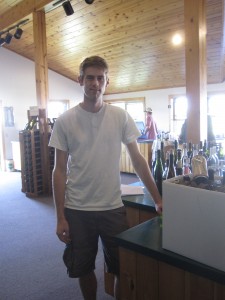I left off in my last entry talking about some of the important concerns related to the different portions of businesses that the Hosmers own and run. I wanted to learn more about the challenges of running a vineyard, winery, and tasting room not only because I might want to run one someday, but because it would make understanding the lives of fellow employees easier and hopefully prepare me for future employment in one a similar position.
The Hosmers have been in the wine industry for more than three decades. When it comes to owning a vineyard, I mentioned that it would likely take at least half a decade to start to see the return on invested time and money. That may not seem as long to Ma

My last day at Hosmer was the 27th anniversary party. By the end of the day, enough wine had been poured to cover one of the serving counters with empty wine bottles.
ren and Tunker today as it does to me. However, it seems pretty amazing that Tunker was no more than a few years older than myself at the time he started to plant his vines, and he must have understood that the longevity of his venture from the very beginning.
It may be a long time until I can feel the same pride for my life’s work that the Hosmers do today, but I think many people can understand a small part of a winegrower’s pride. The feeling of a day well spent, of being relied on and coming through, and of the eventual harvest are things that most people can appreciate. Now, I try to imagine the satisfaction that comes from tending vines that have seen four decades and hope to understand that someday.
The second part of Hosmer’s that I discussed was the winery. Because of the scale of production at Hosmer, Aaron Roisen is the only needed full time winemaker. While pondering Aaron’s job, I realized that there is skill in the vintner’s trade, a great deal of scientific understanding, and all the romance you can imagine. Aaron Roisen even told me last year that (and I am paraphrasing here) “Sometimes one of the best parts of being a wine maker is the reaction you get from other people when you tell them what you do”. While there may commonly exist a high esteem for this trade, what Aaron meant was that, like every other trade, there are many, less desirable parts to the job. After a long day of working in the rain, or a morning and afternoon of bottling (which, if not monotonous, is often stressful), or working weekends to stay in pace with harvest, the recognition for your trade by strangers may seem to be the only consoling thing.
I do not, believe for a second that the “romantic aura” that surrounds a vintner is the main reason for many joining the field and sticking with it. Of much more value to a vintners is not the opinion of strangers that would treat the job with uninformed awe, but the praise of respected peers. Above even that (according to Maslow’s hierarchy of needs) might be the self-actualization or fulfillment associated with challenging one’s self and the opportunity to be creative. Even the act of trying to make the same style of wine from year to year is a difficult task as harvest brings different fruit each year. Aaron told me that creative freedom is a very important part of his wine-making career earlier this summer, and I believe it. In my classes and experiments over the last few years, learning and making new creations have been endlessly engaging. Unfortunately, wines are not to customers what they are to the people who want to buy it. I learned that it is the job of the marketing and distribution to essentially create the image and sell the wine.
This overarching responsibility (to create value to the product and assure the sale of it) holds as much creativity and variation in everyday work. All employees needed to create an environment were customers want to buy wine, while individuals like Katie worked on the website and redesign the logo. Others like Maren, Ginny, and David keep up with all the required records, and they all have the responsibility to manage themselves in an effective way.
Coming into the tasting room, I was less prepared by my school work than the other areas of the company. However, unlike working in the vineyard and the winery, I got the opportunity to have the same job and responsibilities that any tasting room worker had. As a result, I feel like I learned a great deal while working with my friends in the tasting room and everywhere else at Hosmers. Thanks guys for giving me an awesome summer.

Speak Your Mind